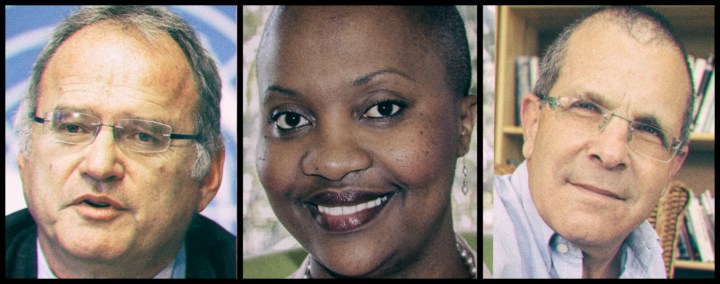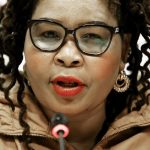Maverick Citizen: Tuesday Editorial
Reflection: Mourning human rights activists

In recent weeks South Africa has lost three of its finest human rights activists. How should we remember them? How do we honour their contributions meaningfully?
Love seeketh not itself to please,
Nor for itself hath any care,
But for another gives its ease,
And builds a heaven in hell’s despair.
(William Blake, The Clod and the Pebble, Songs of Experience, 1794)
At the height of the Aids epidemic in the early 2000s, when Treatment Action Campaign (TAC) activists were dying at a rate of several a week, there was a point where I became afraid that I was becoming immune to the full weight of loss and grief that death gives rise to. I was subconsciously normalising premature death. Now that we are in another season of death and loss there is again a danger that once the memorial services and funerals are over, fellow activists move on too quickly, are too accepting of mortality, too quick to resume “normal life”.
Activism is always a rush and always urgent.
But in the past few weeks the sudden and premature death of three respected activists, the latest in a growing line of friends and comrades taken by Covid-19 and other causes, forced me to pause and think deeply about their values, what their lives meant, and how we will carry them forward.
Christof Heyns, born in 1959, died of a heart attack on 28 March while walking in the mountains at Stellenbosch. Graeme Bloch, born in 1956, died on 9 April after battling progressive supranuclear palsy for years. Sindi van Zyl, born in 1976, died on 10 April as a result of Covid-19.
South Africa is one of the world’s largest exporters of human rights activists and ideas – and we are losing a lot of them. Christof, Graeme and Sindi are but three people in a proud, deep and enduring tradition of human rights activists. Yet, they were both special and symbolic. Their biographies, when written, will tell how they came from very different social milieu: experienced different types of trauma at different times in their lives, had different political or religious influences and epiphanies.
But by different paths and accidents, their life experiences had, from an early age, led each one on a journey to furthering the ideas and realisation of human rights, using skills they acquired in their chosen fields and expertise.
The mantra they followed was entombed in international law in 1948 after one of the last great disruptions of human society, World War 2 and Nazism: “All human beings are born free and equal in dignity and rights. They are endowed with reason and conscience and should act towards one another in a spirit of brotherhood.”
More than 70 years later we may be far from it, but that’s the point of working for change.
Christof did it as a lawyer and teacher; Graeme as a freedom fighter and educationist; Sindi as a doctor and advocate for healthcare rights. Each wove the fabric of democratic South Africa and the world, but did so in ways that were understated and usually unrecognised apart from by those in their circles of friendship or influence.
Despite their and others’ efforts and sacrifices, human rights activists are under attack worldwide; the very notion of human rights and universality itself is being questioned; inequalities are rising.
They did it by little out-of-sight actions and ideas as much as by grand gestures, radical rhetoric and political performance. When asked, their invisible hands would often stretch out to strangers in need of help. They didn’t bill by the hour for their humanity or boast about if afterwards. Their interventions were not about ego or self-promotion, but about building agency, power, self-realisation and purpose in others.
They acquired material security and comfort, but not by selling their souls, accumulating money or abandoning consciousness of all the inequality and suffering around them.
What was also striking about all three was their how central love and a love of living was to their activism.
Each loved music, nature, sports, literature and other people. They literally revelled in life. But they were able to live full lives in a way that did not cause other people to be hurt or suffer; in fact, they proved that helping humanity and advancing other people’s rights can be something joyous and rewarding. Sometimes activism requires ultimate self-sacrifice, as we know from our history, but for the most part human rights activism is usually about forgoing lesser things in life, things we find we don’t need anyway. It’s about not being driven to constantly accumulate, to measure worth only by what you can privatise for yourself, rather than protecting and developing the richness of public places and spaces, including our natural world.
The deaths of these three activists should be a cause for pause. Take stock.
Despite their and others’ efforts and sacrifices, human rights activists are under attack worldwide; the very notion of human rights and universality itself is being questioned; inequalities are rising.
We are back in English poet William Blake’s 18th-century nightmare.
This calls for individual introspection by activists. We need more quality, less quantity; more doing, less talking; more talking with and less talking at; more vulnerability and self-doubt, less arrogance; more work on investigating and sketching out paths of hope that will galvanise and inspire than reactive critique and denigration that debilitates.
Last week, in Maverick Citizen’s editorial about suicide and the unprecedented levels of despair beneath the surface of our society, a despair that has taken further lives in days just passed, I wrote about the need for critical introspection, Ubuntu, and talked about the Constitution as an “articulation of the values and spirit of the humans of South Africa”.
I realise now that subconsciously the role models I had in mind were Christof, Graeme and Sindi. DM/MC




















 Become an Insider
Become an Insider
For every Myeni or Masuku we need a Heyns, Bloch or van Zyl.
But most of all, we need to celebrate their life and works and publicise them so that future generations can choose the right role models!
“…more work on investigating and sketching out paths of hope” New ideas are desperately needed. Our structures & systems were built for another century and a far smaller population. The structure of society is now failing its citizens. (Sorry, bad morning. Loved this, thank you for writing it.)
#countrydutydonedid